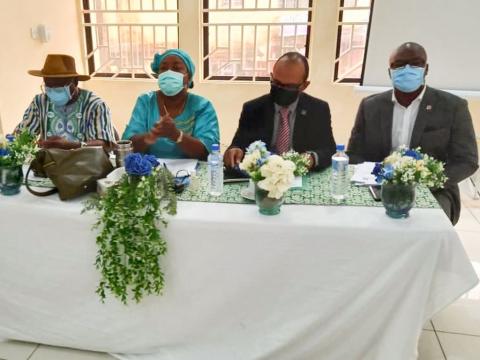By Mabinty M. Kamara
The Policy Adviser at the Ministry of Mines and Mineral Resources has acknowledged the critical role of civil society Organizations in amplifying the voices of the communities and assured them of continued and transparent engagement on the draft Mines and Minerals Development bill.
Daniel Gbondo was responding to a recent Press statement released by National Resources Governance and Extractive Justice Network and concerns raised by Abu Brima, the Civil Society representative at Sierra Leone Extractive Industry Transparency Initiative’s Mutli-Stakeholder Group (MSG) during an Orientation and Refresher workshop held in Freetown on the 5th of August 2021.
Speaking on behalf of the Minister of Mines and Mineral Renounces, Gbondo said that every stakeholder in the extractive sector including the civil Society and MDAs was directly involved in all the processes that resulted in the review of the Mines and Minerals Act of 2009.
“In the review of the mines and Minerals Development Act, we have involved all critical stakeholders. Mr. Brima referred to a meeting held at the Bintumani hotel where we had the civil society, and it was clear that they were representing the voices of the communities and they made critical contributions to the process and those contributions, I can say were captured in the current draft of the Mines and Minerals Development Bill,” he said, noting that the consultation with the government and development partners were still ongoing and that the bill will later be tabled before parliament for their actions.
He added that the bill has new provisions such as the Mining District Development Fund, the Gender Protection and Promotion and the Social Safeguard policies which he referred to as progressive.
He noted that the EITI process was critical for the government and those dealing in the mineral sector because it shows that they want to have a good deal from the exploitation of the mineral resources and that it is the mechanism through which they can be held accountable in a manner in which they manage their national assets.
The Extractive Industries Transparency Initiative (EITI) implements the global standard to promote the open and accountable management of oil, gas, and mineral resources.
It requires the disclosure of information along the extractive industry value chain from the point of extraction, to know how revenues make their way through the government, and how they benefit the public. By doing so, the EITI seeks to strengthen public and corporate governance, promote understanding of natural resource management, and provide the data to inform reforms for greater transparency and accountability in the extractives sector in each of the 55 implementing countries including Sierra Leone who joined in 2006. The EITI is supported by a coalition of government, companies, and civil society known as the Multi-Stakeholder Group.
Speaking at the event, Tomy Kaizre Koker, representative of the Chamber of Mines pledged their commitment to support SLEITI in achieving its goals and also remained committed to the processes they signed up to in the Memorandum of Understanding.
In her statement, the Minister of State in the Office of the Vice President who doubles as the Chairperson of SLEITI Multi-Stakeholder Group, Francess Piagie Alghali said the overall objective of the orientation workshop is geared towards the sustainability of the EITI implementation in Sierra Leone by ensuring the MSG members are familiar with the EITI processes and understand the 2019 EITI standards.
She added that Sierra Leone is committed to the processes of the EITI, because it improves accountability and promotes greater economic and political stability, increase tax collection systems and legal and fiscal frameworks in Sierra Leone, improve investment climate by providing a clear signal to investors and international financial institutions that the government is committed to greater transparency and has always ensured the coordination of the EITI process.
“The EITI is important for us as a country and as a government because it is the global standard for the governance of oil, gas, and mineral resources. The EITI provide the public with knowledge about the extractive sector, information published under the EITI is used by reformers, Policymakers, investors, government, Civil Society actors, academics, journalists, and others to understand the sector. Through the EITI, stakeholders suggest reforms to strengthen transparency and accountability,” she said.
She noted that since Sierra Leone joined the EITI in 2006, it has produced nine reports.
Ms. Alghali, therefore, urged the MSG to play a more robust role in EITI validation process to ensure that countries remain compliant.
Copyright © 2021 Politico Online








